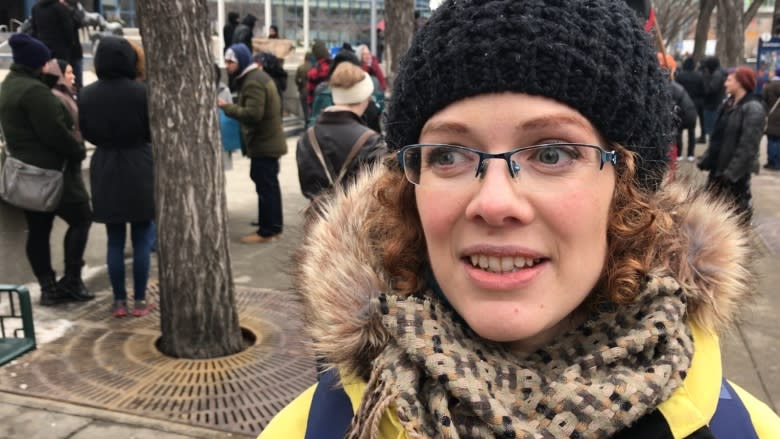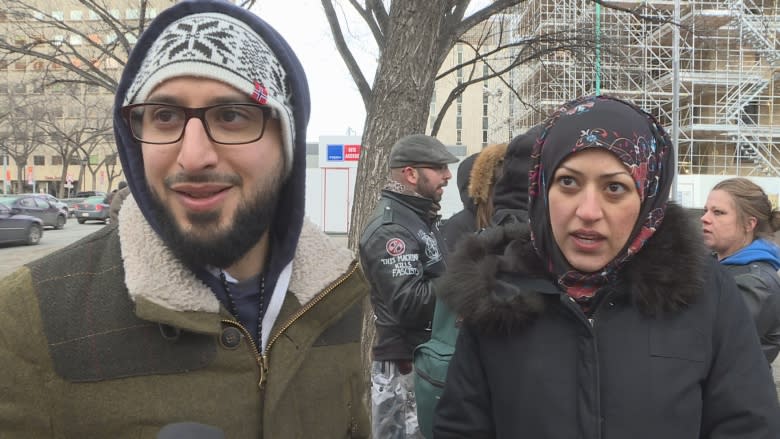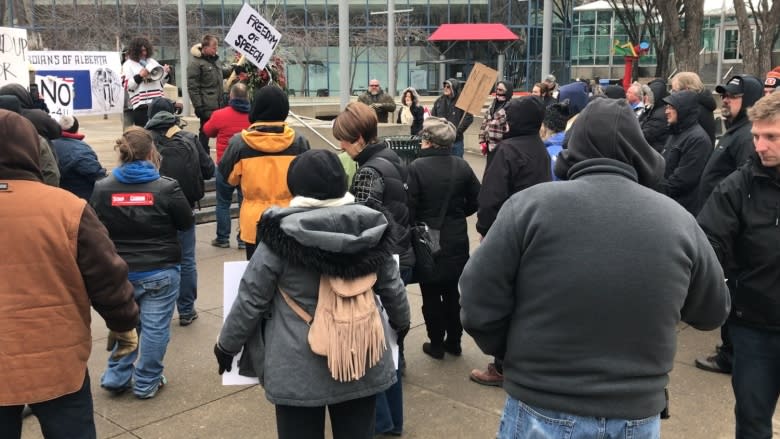Anti-racism motion draws supporters, critics in dueling Calgary rallies
A federal private member's motion condemning discrimination, including Islamophobia, brought a few dozen people out to dueling but peaceful rallies in Calgary on Saturday, joining other communities across the country.
The motion, M-103, introduced in December, calls on the government to condemn all forms of systemic racism and religious discrimination, study hate crimes and conduct needs assessments for impacted communities.
One side calls it an attack on free speech, the other says it is a step in the right direction to combat rising hate crimes against many minority groups, including Muslims.
Saryn Modderman joined the group who say they are fighting racism against Muslims.
"I have been going to some of the rallies in support of Muslims and against racism," Modderman told CBC News.
"At every single one, I do see the Muslims condemn any violence and I never see anyone else have to defend their right to exist."
She said her view on Islam evolved after post-secondary education.
"I grew up thinking that Islam was a very repressive religion and very anti-woman and at the time, I am from small town Saskatchewan, I didn't know any Muslims," she said. "When I went to university I thought I knew all of the answers, but talking to people there who were Muslim made me realize that the things that I had learned were basically propaganda."
The anti-racism group supports M-103 in light of recent threats to Jewish community centres and the killing of six Muslims praying at a Quebec City mosque by university student and former cadet, Alexandre Bissonnette.
The group opposing M-103, just metres away, says the issue is free speech, not religious discrimination.
"This whole thing of Islamophobia is complete nonsense, as far as we are concerned," Stephen Garvey said.
"It was created in the 1990s by the Muslim Brotherhood for the sole reason to silence criticism on Islam."
He says the motion is excessive. "We feel it is going too far," Garvey said.
"In our opinion, no religion, ideology, way of life, should ever come before our freedom of speech. No religion, ideology, way of life, should ever be beyond criticism. These are sacred freedoms that our veterans died for and we need to stand up and makes sure that they are not eroded and right now they are being eroded, so we are here solely for that reason."
Conservative media contributor Bernard Hancock spoke to Garvey's group, slamming the other side, but said the core issues are being lost in the conversation.
"If there is anyone who has to speak out against Islamophobia, it is someone within the conservative movement because these guys will listen to me," Hancock said.
"These people want to come here and say 'all Muslims are bad.' It's just this black-and-white thinking, this false dichotomy is poisoning dialogue, it is this hot button issue."
The groups didn't meet, perhaps in part to a police presence, but some individuals wandered from side to side.
That, says Mona Jabbar of the anti-racism group, is a good thing.
"I think it has actually been very productive," Jabbar said.
"As much as it is causing a lot of uproar among people, like the woman we were just speaking to, she was swearing and yelling, but when you do get past that, she has real concerns that she wants to have addressed. Unless we actually sit and talk about it, then it is just going to turn into protests and possibly further violence."
Her husband, Abe Jabali, says conflict in itself isn't necessarily a bad thing.
"I think there is division in everything," Jabali said.
"Politics divides people, there are people fighting because of politics. They are people fighting over what we are going to cook for dinner. There are always going to be fights, but as long as we can come to a resolution peacefully, that is all that matters."
For Modderman, meanwhile, it's about increasing education and reducing ignorance.
"I have Muslim friends that I care a lot about so it is easy for me to see them as people, I know them," she explained.
"There are people who won't even become friends with Muslims because they are afraid of them. I don't know how to reach those people. I don't know how to talk to them. I do see that they are afraid and they want a good life for their children, I just don't know how to communicate to them, that loving your neighbour is going to do that better, than trying to persecute them and drive them out."
- MORE ALBERTA NEWS | Lawyer questions Kellie Leitch's understanding of immigration system
- MORE ALBERTA NEWS | 'A very big concern,' says Alberta justice minister of stayed charges due to staff shortage






